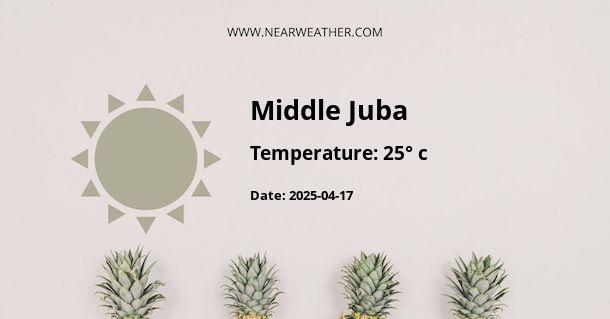Climate and Weather in Gobolka Jubbada Dhexe, Somalia
Gobolka Jubbada Dhexe, situated in the southern part of Somalia, is a region that experiences a semi-arid type of climate, typical of the East African tropics. The weather in this region offers a unique blend of high temperatures, considerable rainfall, and humidity levels that vary throughout the year. This article provides a comprehensive overview of the climate and weather patterns in Gobolka Jubbada Dhexe, complete with detailed analysis and expert opinions.
General Climate Overview
The climate in Gobolka Jubbada Dhexe can be described as a tropical savannah climate, characterized by two main seasons: the dry season and the rainy season. The region receives substantial rainfall during the rainy season and experiences high temperatures throughout the year.
According to the Köppen Climate Classification system, Gobolka Jubbada Dhexe falls under the 'Aw' category, signifying a tropical savannah climate with a pronounced dry season.
Temperature
Temperature levels in Gobolka Jubbada Dhexe remain consistently high throughout the year, reflecting the region's proximity to the equator. The average annual temperature is around 27-30 degrees Celsius, with minimal variation between the warmest and coolest months.
| Month | Average High (°C) | Average Low (°C) |
|---|---|---|
| January | 32 | 24 |
| February | 33 | 25 |
| March | 34 | 25 |
Rainfall and Humidity
Gobolka Jubbada Dhexe experiences a significant amount of rainfall throughout the year, with the heaviest precipitation occurring during the Gu (April to June) and the Dayr (October to November) seasons. The region experiences its driest period in the Jilaal season (December to March). Humidity levels can range from 50% to 80%, depending on the time of year and the amount of recent rainfall.
Seasonal Variation
Seasonal changes in Gobolka Jubbada Dhexe are primarily determined by rainfall patterns rather than temperature fluctuations. The region experiences two rainy seasons and two dry seasons each year. The Gu, which runs from April to June, is the long rainy season, while the Dayr, from October to November, is the short rainy season. The two dry seasons are the Jilaal, from December to March, and the Hagaa, from July to September.
Impact on Local Lifestyle and Economy
The climate and weather in Gobolka Jubbada Dhexe play a significant role in shaping the local lifestyle and economy. The agricultural sector is heavily dependent on the weather patterns, with farming activities often synchronized with the rainy seasons. The region is also known for its livestock rearing, with the availability of pasture greatly influenced by the rainfall patterns.
According to the Food and Agriculture Organization (FAO), the climate in Gobolka Jubbada Dhexe is pivotal in determining agricultural productivity and food security in the region.
Climate Change and Its Impact
Like many regions across the globe, Gobolka Jubbada Dhexe is grappling with the effects of climate change. These include changes in rainfall patterns, rising temperatures, and increased frequency of extreme weather events. These climatic shifts have significant implications for the region's socio-economic stability and environmental sustainability.
Conclusion
In conclusion, the semi-arid climate of Gobolka Jubbada Dhexe offers a unique blend of high temperatures and considerable rainfall, shaping not only the natural landscape but also the lifestyle and economy of the region. Understanding the nuances of this climate is critical for effective planning and sustainable development in the region.
A - Middle Juba's Latitude is 1.333330 & Longitude is 42.666672.
A - Weather in Middle Juba is 33° today.
A - Climate Conditions in Middle Juba shows overcast clouds today.
A - Humidity in Middle Juba is 38% today.
A - Wind speed in Middle Juba is 22.68 km/h, flowing at 133° wind direction. today.
